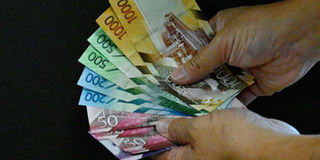Where are our Bloombergs and Jack Mas when we need them?

New Kenyan currency notes. Here is an opportunity for our own billionaires and rich families to show us that attractive face of capitalism, demonstrate compassion and show that they are also committed to doing good in society. FILE PHOTO | SIMON MAINA | AFP
What you need to know:
- All we need is to create the right vehicle to choose Kenyan men and women of status and calibre to lead the process of raising the money.
- We must still all agree that in the scale of measures and interventions required to contain the pandemic, philanthropy can only play a small part.
- The truth of the matter is that the pandemic poses massive risks to our economy.
In South Africa, rich families are falling over one another to donate billions into a solidarity fund that has been established by President Cyril Ramaphosa to help track the spread of the virus, care for the ill and support those whose lives have been disrupted.
Where are our own billionaires? I don’t see why our rich families and our own philanthropists are not being called upon and challenged to join the fight against a pandemic that threatens not only the survival of their own businesses but the broader macro economy in general. All we need is to create the right vehicle to choose Kenyan men and women of status and calibre to lead the process of raising the money.
FUND-RAISING
In the right circumstances, and as long as the fund-raising process is conducted with transparency and integrity, businesses can provide leadership, supply organisation, marshal human resources and provide financial support to the fight against the virus.
In South Africa, two billionaire families, the Rupert and Oppenheimer families, recently contributed the equivalent of Sh5 billion each to their coronavirus solidarity fund.
Here is an opportunity for our own billionaires and rich families to show us that attractive face of capitalism, demonstrate compassion and show that even though they are in business to make profits, they are also committed to doing good in society.
We must still all agree that in the scale of measures and interventions required to contain the pandemic, philanthropy can only play a small part.
The most effective type of fiscal policy to deal with the pandemic is massive investment in public health infrastructure. Until we start seeing aggressive investment in testing equipment, ICU beds, ventilators, respirators, we will not have achieved much. We need to quickly evolve capacity in surveillance and in tracking people who have interacted with those who have tested positive.
I keep wondering whether this economy is capable of surviving a protracted lockdown. We are good at hiding our economic blemishes.
The truth of the matter is that the pandemic poses massive risks to our economy. The weakest link of course is the tourism, travel and hospitality sectors. Right now, players in this sector are crossing their fingers, looking at the future with a sense of foreboding and hoping that we will somehow be able to contain the pandemic before the peak tourism season - usually between May and September - kicks in.
DISRUPTION
Yet damage and disruption to tourism is but a small issue. The biggest risk the coronavirus poses to the macro economy is a shutdown in economic activity and damage to the health of government finances.
Because we have a huge portfolio of external debts, we are at a point where any negative pressures on our exchange is bound to cause the cost of servicing public debt to spiral beyond control, with negative consequences to the stability of the government’s spending programs. We must not forget that this pandemic has hit us in a context where revenue collection trends are not looking too good. The following recent numbers from the Treasury show the dire state of government revenues.
In February this year, total revenues were below target by Sh187 billion. And the shortfalls in revenues affected nearly all categories of taxes with excise taxes falling below target by Sh31 billion, income tax by Sh39 billion, import duties by Sh15 billion and VAT by Sh28 billion.
Long before the coronavirus, government revenues were already going south. If the pandemic worsens, revenues, especially import-related taxes such import duty, VAT on imports, import declaration fees and the railway development levy, are likely to drop even further.
Which is why, it does not surprise that Treasury has just revised its own revenue projections downwards to reflect a shortfall of Sh69 billion this financial year.
REVENUE SHORTFALLS
It is a very conservative estimate because the projections for revenue shortfalls by the Treasury are based on the assumption that the government will not impose a lockdown on the economy at any one point in the coming months and that the prevailing conditions will not last beyond three months.
What is the Treasury planning and what are we likely to see in the about-to-be-released supplementary estimates?
Deep cuts in the development and recurrent budgets, especially votes for travel training and conferences, including suspension of some development projects. Accessing the money from the Sh 7 billion contingence fund.
Finally, hastening negotiations with both the World Bank and the International Monetary Fund (IMF) to allow the government to access some Sh 6 billion from the World Bank and the facility of Sh 38 billion from the IMF. Clearly, economic conditions and the path for the country in the medium term is likely to be rocky.





